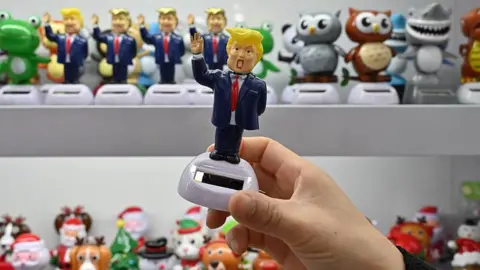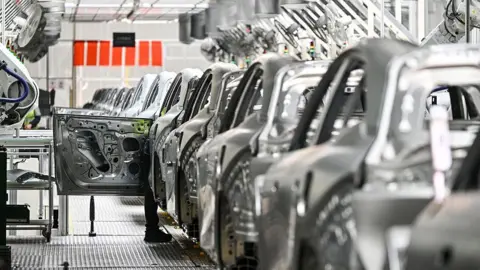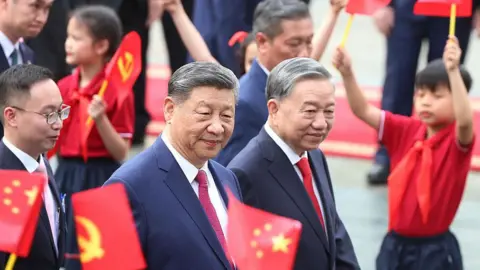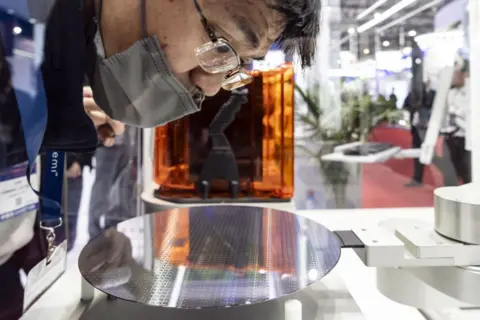 Getty Photographs
Getty PhotographsA commerce conflict between the world’s two greatest economies is now in full swing.
Chinese language exports to the US resist 245% tariffs, and Beijing has hit again with a 125% levy on American imports. Shoppers, companies and markets are braced for extra uncertainty as fears of a world recession have heightened.
Chinese language President Xi Jinping’s authorities has repeatedly stated it’s open to dialogue, however warned that, if essential, it will “battle to the tip”.
This is a have a look at what Beijing has in its arsenal to counter US President Donald Trump’s tariffs.
China can take the ache (to a degree)
 Getty Photographs
Getty PhotographsChina is the world’s second-largest financial system, which implies it may possibly soak up the impacts of the tariffs higher than different smaller nations.
With greater than a billion folks, it additionally has an enormous home market that might take a few of the strain off exporters who’re reeling from tariffs.
Beijing remains to be fumbling with the keys as a result of Chinese people are not spending enough. However with a variety of incentives, from subsidies for family home equipment to “silver trains” for travelling retirees, that might change.
And Trump’s tariffs have given the Chinese language Communist Occasion an excellent stronger impetus to unlock the nation’s shopper potential.
The management could “very properly be keen to endure the ache to keep away from capitulating to what they imagine is US aggression”, Mary Pretty, a US-China commerce professional on the Peterson Institute in Washington DC, advised BBC Newshour earlier this month.
China additionally has the next threshold for ache as an authoritarian regime, as it’s far much less nervous about short-term public opinion. There isn’t any election across the nook that may decide its leaders.
Nonetheless, unrest is a priority, particularly as a result of there may be already discontent over an ongoing property disaster and job losses.
The financial uncertainty over tariffs is yet one more blow for younger individuals who have solely ever recognized a rising China.
The Occasion has been interesting to nationalist sentiments to justify its retaliatory tariffs, with state media calling on folks to “climate storms collectively”.
President Xi Jinping could also be nervous however, to this point, Beijing has struck a defiant and assured tone. One official assured the nation: “The sky is not going to fall.”
China has been investing sooner or later
 Getty Photographs
Getty PhotographsChina has all the time been referred to as the world’s manufacturing unit – but it surely has been pouring billions into turning into a much more superior one.
Below Xi, it has been in a race with the US for tech dominance.
It has invested closely in homegrown tech, from renewables to chips to AI.
Examples embrace the chatbot DeepSeek, which was celebrated as a formidable rival to ChatGPT, and BYD, which beat Tesla final yr to turn out to be the world’s largest electrical automobile (EV) maker. Apple has been shedding its prized market share to native rivals comparable to Huawei and Vivo.
Not too long ago Beijing introduced plans to spend greater than $1tn over the subsequent decade to assist innovation in AI.
US firms have tried to maneuver their provide chains away from China, however they’ve struggled to search out the identical scale of infrastructure and expert labour elsewhere.
Chinese language producers at each stage of the provision chain have given the nation a decades-long benefit that may take time to duplicate.
That unrivalled provide chain experience and authorities assist have made China a formidable foe on this commerce conflict – in some methods, Beijing has been making ready for this since Trump’s earlier time period.
Classes from Trump 1.0
 Getty Photographs
Getty PhotographsEver since Trump tariffs hit Chinese language photo voltaic panels again in 2018, Beijing sped up its plans for a future past a US-led world order.
It has pumped billions right into a contentious trade and infrastructure programme, higher referred to as the Belt and Street initiative, to shore up ties with the so-called International South.
The enlargement of commerce with South East Asia, Latin America and Africa comes as China tries to wean itself off the US.
American farmers as soon as provided 40% of China’s soybean imports – that determine now hovers at 20%. After the final commerce conflict, Beijing ramped up soy cultivation at residence and purchased document volumes of the crop from Brazil, which is now its largest soybean provider.
“The tactic kills two birds with one stone. It deprives America’s farm belt of a as soon as‑captive market and burnishes China’s meals safety credentials,” says Marina Yue Zhang, affiliate professor on the College of Expertise Sydney’s Australia-China Relations Institute.
The US is not China’s greatest export market: that spot now belongs to South East Asia. In actual fact China was the biggest buying and selling companion for 60 nations in 2023 – practically twice as many because the US. The world’s greatest exporter, it made a document surplus of $1tn on the finish of 2024.
That does not imply the US, the world’s greatest financial system, isn’t an important buying and selling companion for China. However it does imply it isn’t going to be simple for Washington to again China right into a nook.
Following experiences that the White Home will use bilateral commerce negotiations to isolate China, Beijing has warned nations towards “reaching a deal at the expense of China’s interests”.
That might be an impossible choice for a lot of the world
“We will not select, and we are going to by no means select [between China and the US],” Malaysia’s commerce minister Tengku Zafrul Aziz advised the BBC final week.
China now is aware of when Trump will blink
 Getty Photographs
Getty PhotographsTrump held agency as shares plummeted following his sweeping tariffs announcement in early April, likening his staggering levies to “drugs”.
However he made a U-turn, pausing most of these tariffs for 90 days after a pointy sell-off in US authorities bonds. Often known as Treasuries, these have lengthy been seen as a secure funding. However the commerce conflict has shaken confidence within the belongings.
Trump has since hinted at a de-escalation in commerce tensions with China, saying that the tariffs on Chinese language items will “come down considerably, but it surely will not be zero”.
So, consultants level out, Beijing now is aware of that the bond market can rattle Trump.
China additionally holds $700bn in US authorities bonds. Japan, a staunch American ally, is the one non-US holder to personal greater than that.
Some argue that this provides Beijing leverage: Chinese language media has commonly floated the concept of promoting or withholding purchases of US bonds as a “weapon”.
However consultants warn that China is not going to emerge unscathed from such a state of affairs.
Moderately, it can result in big losses for Beijing’s investments within the bond market and destabilise the Chinese language yuan.
China will solely have the ability to exert strain with US authorities bonds “solely up to a degree”, Dr Zhang says. “China holds a bargaining chip, not a monetary weapon.”
A chokehold on uncommon earths
 Getty Photographs
Getty PhotographsWhat China can weaponise, nevertheless, is its close to monopoly in extracting and refining uncommon earths, a variety of parts necessary to superior tech manufacturing.
China has big deposits of those, comparable to dysprosium, which is utilized in magnets in electrical automobiles and wind generators, and Yttrium, which gives heat-resistant coating for jet engines.
Beijing has already responded to Trump’s newest tariffs by proscribing exports of seven uncommon earths, together with some which are important for making AI chips.
China accounts for about 61% of uncommon earths manufacturing and 92% of their refining, based on estimates by the Worldwide Vitality Company (IEA).
Whereas Australia, Japan and Vietnam have begun mining for uncommon earths, it can take years earlier than China may be lower out of the provision chain.
In 2024, China banned the export of one other essential mineral, antimony, that’s essential to varied manufacturing processes. Its worth greater than doubled amid a wave of panic shopping for and a seek for various suppliers.
The worry is that the identical can occur to the uncommon earths market, which might severely disrupt numerous industries from electrical automobiles to defence.
“All the things you possibly can change on or off doubtless runs on uncommon earths,” Thomas Kruemmer, director of Ginger Worldwide Commerce and Funding, told the BBC beforehand.
“The affect on the US defence trade might be substantial.”

